Джонатан Троппер - This Is Where I Leave You
Здесь есть возможность читать онлайн «Джонатан Троппер - This Is Where I Leave You» весь текст электронной книги совершенно бесплатно (целиком полную версию без сокращений). В некоторых случаях можно слушать аудио, скачать через торрент в формате fb2 и присутствует краткое содержание. Год выпуска: 2009, ISBN: 2009, Издательство: Penguin Group (USA), Inc., Жанр: Проза, на английском языке. Описание произведения, (предисловие) а так же отзывы посетителей доступны на портале библиотеки ЛибКат.
- Название:This Is Where I Leave You
- Автор:
- Издательство:Penguin Group (USA), Inc.
- Жанр:
- Год:2009
- ISBN:978-1-101-10898-7
- Рейтинг книги:5 / 5. Голосов: 1
-
Избранное:Добавить в избранное
- Отзывы:
-
Ваша оценка:
- 100
- 1
- 2
- 3
- 4
- 5
This Is Where I Leave You: краткое содержание, описание и аннотация
Предлагаем к чтению аннотацию, описание, краткое содержание или предисловие (зависит от того, что написал сам автор книги «This Is Where I Leave You»). Если вы не нашли необходимую информацию о книге — напишите в комментариях, мы постараемся отыскать её.
This Is Where I Leave You — читать онлайн бесплатно полную книгу (весь текст) целиком
Ниже представлен текст книги, разбитый по страницам. Система сохранения места последней прочитанной страницы, позволяет с удобством читать онлайн бесплатно книгу «This Is Where I Leave You», без необходимости каждый раз заново искать на чём Вы остановились. Поставьте закладку, и сможете в любой момент перейти на страницу, на которой закончили чтение.
Интервал:
Закладка:
Animal Control put down Max two weeks later, after a hearing my father attended armed with grisly pictures of Paul’s injuries. Suits and countersuits were filed, criminal charges leveled and dismissed. A few weeks later I finally kissed Alice Taylor in a darkened movie theater, and then surprised us both by crying like a baby.
Saturday
Chapter 29
Iwake up strangely energized, my stomach growling. Upstairs, the overstocked fridge offers me its bounty of sympathy food. I throw some cheese slices onto a soft bagel and then head up to the second floor. I haven’t been up here since I got back. The bedroom doors are all closed, so there’s really not much to see. I tiptoe up the attic stairs, which creak like a haunted house, and out the access window to the roof, climbing up the slate until I’m sitting at the highest point of the gable. When I was a kid I used to climb up here to look down at the block and gather my thoughts in private. Paul would climb up here with Boner to smoke weed and look at porn, and Wendy would come up to get a tan while her nails dried. I don’t know if Phillip ever figured out the roof. By the time he was old enough, we were all out of the house.
Knob’s End is on a high elevation, so you can see a lot from up here. You can see into backyards for blocks, swimming pools, swing sets, barbecues, discarded toys. You can see across the rooftops to where the early morning joggers are running on the track behind the baseball diamond in the county park over on Fenimore. You can watch the sun come up, coloring the sky white, then pink, then blue.
You can see your older sister, barefoot in boxer shorts and a T-shirt, walking hurriedly up the block from the direction of the Callens’, tying her long, mussed hair back as she goes, and wonder what she might be doing coming from there at this hour. And then, just minutes after she’s let herself in below, you can observe Linda Callen leaving your childhood home to quietly make her way down the block back to her house. It would probably help to see Linda’s expression, but her back is to you, so you can only guess at it. You can ponder these two women, who miss each other by a matter of minutes, walking exactly opposite routes as quietly as the dew now dropping in a mist on the grass and on your face, and you can hazard any number of guesses as to what business they might be tending to in the soft focus of these hushed morning hours when the day is taking its first tentative breaths. You can sit up here, feeling above it all while knowing you’re not, coming to the lonely conclusion that the only thing you can ever really know about anyone is that you don’t know anything about them at all.
I STEP OUT of the shower into pitch darkness. By now this has become routine. Wrapped in my towel, I walk across the basement to the circuit breaker. But this time, when I flip the switch, there is a crackle of electricity, a flash of blue light, and I am blown out of my towel and backward across the room, where I land flat on my back, poised on the precipice of unconsciousness. My body tingles with electricity, and I can feel every molecule in me, thrumming in harmony. I close my eyes and . . .
. . . I am three years old and riding my red plastic motorcycle in the park. It’s cold out, I’m wearing my navy blue ski hat, and my nose is running copiously into my scarf. The plastic wheels of the motorcycle clatter loudly against the cracked asphalt as I push off with my feet to propel myself around an Olympic-sized sandbox. I don’t know if I’m going clockwise or counterclockwise. I’m three years old; I don’t know from clocks. Suddenly, a kid appears in my path, tall and fat, two lines of snot running equilaterally down from his nose to the corners of his mouth. He holds a gray milk crate over his head like the Ten Commandments being brought down from Sinai. “The Hulk!” he screams at me. I don’t know what he means. I’m years away from Marvel comics, and even once I discover them, The Incredible Hulk will never make sense to me. Is he a good guy or a bad guy? You’re never really sure, and moral ambivalence has no place in childhood. I’m three years old, and I have never heard of The Incredible Hulk, but this kid clearly relates to him intimately. And maybe he’s pretending the milk crate is a car, or a house, or a large boulder, or an archenemy, I don’t know. Whatever it’s supposed to be, it hurts like hell when it hits my face. And then I’m off the motorcycle, lying on my side, the grit of the cold asphalt biting into my cheek. My nose and mouth are bleeding, and I’m coughing and spitting and crying, gagging on my own blood.
And then I’m borne up into the air by powerful arms, lifted high above the fat kid and my plastic motorcycle and the earth, really, my face pressed into my savior’s large shoulder, which is somehow hard and soft at the same time. I bleed into the fuzz of his peacoat as he rubs my back and says, “It’s okay, bubbie. You’re okay. Everything’s fine.” And then he stands me up on a bench and pulls out a handkerchief to softly wipe away my blood. “That little bastard really nailed you,” he says, gently picking me up again. I don’t know what a little bastard is, I don’t know who the Hulk is, I don’t remember what exactly happened, but my father is holding me safely above the fray, and I’m burrowed hard into his powerful chest, and I’m aware of the fat kid somewhere down below, but I know the little bastard can’t reach me up here.
I COME TO with my mother’s worried face hovering over me. “Judd,” she says softly. “Just stay there for a moment.” There are deep shadows under her eyes, and at this angle, the gray roots of her hair frame the upper half of her face. She looks tired and old, and I feel a surge of tenderness toward her. I’m still vibrating.
“He called me bubbie,” I say.
“What, dear?”
“When I was little. Dad used to call me bubbie.”
Mom looks at me and smiles. “I remember,” she says, rubbing my chest.
“You’re crying,” I say.
“So are you.”
And now I can feel the abundant wetness on my face, and she comes in and out of focus as I blink through fresh tears. “I miss him,” I say, and something in me breaks.
And then Mom lets out an anguished cry and drops her head to sob into my chest while I cry into the brittle tangle of her hair, and we stay like that for a good long while.
Chapter 30
This being Saturday, the laws of shiva are suspended, all outward signs of mourning put aside in honor of the Sabbath. Boner stops by to give us the news. He is dressed in a dark suit with a black shirt and looks ready to go out clubbing.
“You are still in mourning, of course,” he says. “But there will be no visitors today, no outward observance of shiva.”
“So, it’s like a day off,” I say.
“Not quite,” he says. He looks at my mother, who nods, and then looks back at us. “This morning, you’ll all come to temple to say Kaddish at morning services.”
“Kaddish?”
“The prayer for the soul of the departed.”
“Why can’t we say it here?” Paul says.
“Kaddish is said responsively. It can only be said with a minyan, a quorum of at least ten men present to respond.”
Paul looks at his childhood friend exasperatedly. Give me a break! But Boner just looks back and shrugs. I don’t make the rules.
Paul blinks first. “When do services start?”
Boner checks his watch. “In twenty-five minutes. You’d better get dressed.”
Читать дальшеИнтервал:
Закладка:
Похожие книги на «This Is Where I Leave You»
Представляем Вашему вниманию похожие книги на «This Is Where I Leave You» списком для выбора. Мы отобрали схожую по названию и смыслу литературу в надежде предоставить читателям больше вариантов отыскать новые, интересные, ещё непрочитанные произведения.
Обсуждение, отзывы о книге «This Is Where I Leave You» и просто собственные мнения читателей. Оставьте ваши комментарии, напишите, что Вы думаете о произведении, его смысле или главных героях. Укажите что конкретно понравилось, а что нет, и почему Вы так считаете.
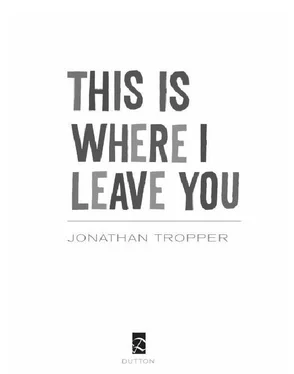
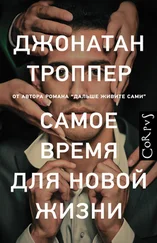
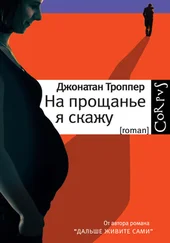

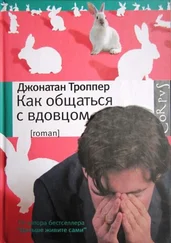
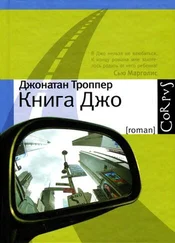
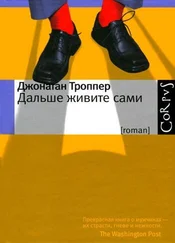
![Джонатан Троппер - Как общаться с вдовцом [litres]](/books/429483/dzhonatan-tropper-kak-obchatsya-s-vdovcom-litres-thumb.webp)
![Джонатан Троппер - Дальше живите сами [litres]](/books/429484/dzhonatan-tropper-dalshe-zhivite-sami-litres-thumb.webp)



